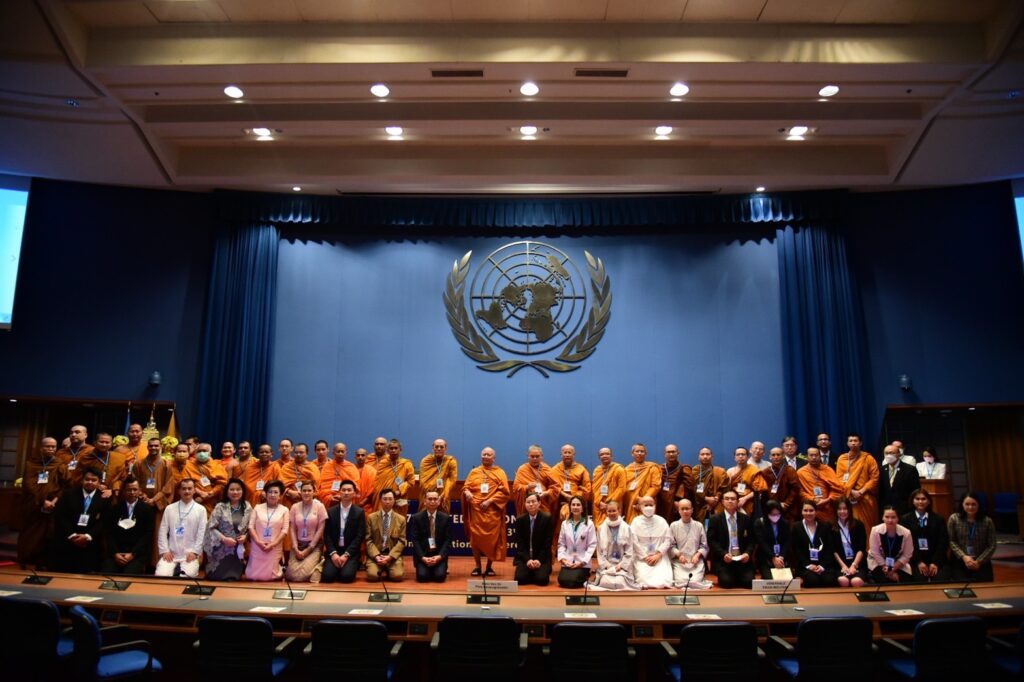Buddhism and Gross National Happiness (GNH)
Buddhism and Gross National Happiness (GNH)
- Article of ALOK MIND (Buddhist Philosophy) No. 2.
- Author: Bhikkhu ALOKA
- Published by ALOK MIND Foundation
- Issued: 19 September, 2023
Abstract:
This paper is to explore the fundamental connection between Buddhism and Gross National Happiness (GNH), with a focus on Bhutan, the origin of GNH. Based on the ancient teachings of Gautama Buddha, Buddhism offers the meaningful vision into human existence, emphasizing that suffering arises from perceptions of self and material attachments. It highlights the intrinsic role of mental and spiritual development in attaining true happiness, transcending material wealth. While not condemning material prosperity, Buddhism views it as a tool for good, fostering acts of generosity and positive karma, essential components of GNH. This paper critically analyzes how Buddhism’s principles, including the Noble Eightfold Path, Four Noble Truths, Four Brahmavihāra, and mindfulness, contribute to the understanding and cultivation of GNH.

Nuanced Notion of Happiness in Buddhism
In Buddhism, the concept of happiness, known as “sukha” in Pali, transcends the conventional understanding of Western happiness. Sukha is intrinsically linked to the reduction of “dukkha,” or suffering, and encompasses various stages of human development. Happiness in Buddhism is a dynamic process that involves the gradual diminishment of suffering through the comprehension of life’s innate interdependence, guided by right views and a mind purified of delusions. Central to this comprehension are the Four Noble Truths, expounding on the nature, causes, and ultimate elimination of suffering.
The Stratified Nature of Happiness
Buddhism categorizes happiness into distinct levels. The lowest level, “kāmasukha,” arises from sensory pleasures experienced through the eyes, ears, nose, tongue, and body. While providing a modicum of happiness, it is also fraught with potential suffering and discontentment, particularly when driven by unchecked desires.
(a) “Undeveloped kāmasukha” emanates from untamed minds, often ensnared by troublesome desires and oblivious to the impermanence, suffering, and transience of life. This insatiable craving, termed “taṇhā,” can breed frustration and dissatisfaction.
(b) In contrast, “developed kāmasukha” represents a more mature form of happiness. It entails the wise use of material wealth for the benefit of society, guided by moral principles (sīla), generosity (dāna), and wisdom (paññā). This approach nurtures a sustainable and harmonious coexistence, a cornerstone of Gross National Happiness (GNH).
While, Buddhism underscores that true and sustainable happiness surpasses material acquisitions, epitomized as inner happiness. This elevated level of happiness originates within one’s consciousness, impervious to external vicissitudes, signifying the ultimate goal of human development.
The Significance of Mind Development
Happiness depends on the mind transcends physical well-being, emanating from within rather than external circumstances. This elevated form of happiness emanates from a mind characterized by clarity, peace, and potency, enriched by virtues such as loving-kindness (mettā), compassion (karuṇa), sympathetic joy (Muditā), equanimity (Upekkhā) and right wisdom. It promotes generosity and selflessness, nurturing a society where the act of giving supersedes that of acquiring, becoming the fount of joy.
Mind development begets a higher-quality mental state marked by strength, lucidity, and serenity. These attributes lay the way for the cultivation of virtues and wisdom, integral components of producing happiness. However, Buddhism recognizes that attachment to this level of happiness may produce dissatisfaction when expectations remain unfulfilled, underscoring the need for continued refinement.
4 Brahmavihāra (Sublime Living) to Establish GNH
Integral to Buddhism is the cultivation of an attitude rooted in compassion and altruism, serving as a conduit for global happiness. The four Brahmavihāra-loving-kindness (Mettā), compassion (Kāruna), sympathetic joy (Muditā), and equanimity (Upekkhā)-lay the foundation for this benevolent our mindset. These virtues or practices inspire individuals to manifest compassion and selflessness, cultivating qualities that support Gross National Happiness (GNH). As a Myanmar Buddhist monk, the present author would like to suggest to Myanmar’s political leaders and policymakers that they need to incorporate these virtuous practices into their efforts to promote Myanmar’s Gross National Happiness and to build civilized society.
This attitude is particularly relevant for policymakers and decision-makers, guiding society toward a collective pursuit of happiness. Educational and mentorship programs assume a pivotal role in disseminating these values, empowering individuals to lead lives infused with greater happiness.
Mindfulness on Economic Growth
In the contemporary era, a prevailing belief hypothesizes that fast economic growth is the key to happiness. Buddhism, however, accentuates the importance of mindfulness and advocates for a balanced approach to development. Mindfulness empowers individuals to distinguish happiness in both their mental and physical well-being, guiding society away from the perils of unchecked materialism.
The Path to Ultimate Happiness
At the essence of Buddhism lies the Four Noble Truths, which offer a structured path to happiness by addressing the root cause of suffering: attachment or craving. By comprehending and ultimately eliminating this craving, individuals can attain happiness and liberation. This profound wisdom propels individuals toward the active pursuit of happiness through the deep practice of these truths.
Contentment in Achieving Happiness
Contentment emerges as a key factor in the pursuit for happiness. It does not involve the abandonment of basic needs but rather the cultivation of satisfaction with one’s present circumstances, mitigating the ceaseless thirst for more. Contentment brings appreciation up, reduces jealousy, and limits miserliness, ultimately contributing to a happier life.
Conclusion
The principles of Buddhism illuminate effective way for pursuing Gross National Happiness (GNH). By comprehending the dynamic nature of happiness, acknowledging the primacy of mental development, and embracing the spirit and attitude of contentment, society can get a transformative journey toward bearing well-being and fulfillment. The integration of these principles into policy-making and individual conduct can make the way for a civilized society as well as a happier and more harmonious world.
References
Bhikkhu Ñāṇamoli (Tr.). (2010). Bhadantacariya Buddhaghosa, The Path of Purification (Visuddhimagga). Kandy: Buddhist Publication Society.
Payutto, P.A. (Phra Brahmagunabhorn). (2011). A brief Introduction to the Buddha-Dhamma. Bangkok: Phli-dhamma Publication.
Jessica Ball. (2010). Using a Policy of „Gross National Happiness’ to Guide the Development of Sustainable Early Learning Programs in the Kingdom of Bhutan: Aspirations and Challenges. Bhutan: University of Victoria.
Karma Ura, The Experience of Gross National Happiness as Development Framework, Oxford Poverty and Human Development Initiative, Oxford University, No. 42, (December 2015).
Ritu Verma, Gross National Happiness: meaning, measure and degrowth in a living development alternative, University of California, DOI: 10.2458/v24i1.20885, (September 2017).

Author: Venerable Aloka (Arlawka), Co-Master of ALOK MIND PROGRAM.


Leave a Reply